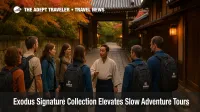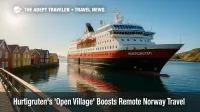Slow Travel

Have you ever thought about the way we move around, the way we travel? I mean, we're constantly on the go, zipping from one place to the next at the speed of, well, life itself. But, slow travel, that's a different beast altogether. It’s more of a slow dance than a quickstep. There's something quite captivating about slow travel. It’s like deciding to walk instead of run, to savor rather than to gulp. And in today’s fast-paced world, maybe that’s what makes it such an intriguing proposition.
When we talk about slow travel, it isn't just about the physical speed of travel. No, it's more about the experience itself, the journey rather than the destination. There's something almost meditative about choosing to immerse oneself deeply in a new environment. Think about it: taking the time to soak in the culture, the aromas, the textures of a place. It’s odd that I'm rambling about it, but there's a sense of richness there, a density of experience that’s sometimes absent in our usual rush-rush holiday itineraries.
The Essence of Slow Travel
So, what is the essence of slow travel, really? It's funny, but the first thing that pops into my mind is simplicity. Traveling slowly often means fewer plans, less stress. Imagine not having a strict schedule. No endless checkmarks on a must-see list. Instead, you could explore a charming little village, chat with local shopkeepers, or perhaps stumble upon a secluded spot that isn’t in any guidebook. There’s a pureness to it.
While having your itinerary packed to the brim might offer you the illusion of productivity, slow travel indulges in the luxury of doing nothing much at all. Come to think of it, it’s an almost rebellious act against relentless efficiency. It’s about being present, deeply present, and letting the world unfold around you instead of controlling it.
Time’s Funny Thing About Slow Travel
Time! Time becomes elastic in slow travel. Have you noticed how a five-minute coffee break in a bustling city flies by in a blur? But in the heart of a quiet village, sipping a cup can feel like a lifetime of tranquility. The passage of time almost bends, and you become hyper-aware of every small detail, every nuance. It's this appreciation of the seemingly insignificant moments which really defines slow travel. In cities, we tend to measure our days by hours and minutes, but in slower journeys, it's experiences and feelings that become the currency of time.
There’s a sort of timelessness about it, isn’t there? A feeling that you’re not just killing time but actually living within it. Or wait, maybe it's the other way around—time lives within you.
Encounters on the Road Less Traveled
It strikes me how slow travel allows for those unplanned encounters, those delightful surprises that fuel our travel stories for years to come. When you're not rushing from one tourist hotspot to another, there’s time to meet people, understand their stories, and let them change yours. Imagine serendipitously joining a local festival or simply sharing a meal with strangers who soon become friends.
I often wonder if these unexpected interactions are what make travel truly transformative. Maybe the thrill isn't in the places, but in the people we meet along the way. It’s fascinating how these moments can reshape our perceptions and understanding of different cultures—sometimes even our own beliefs. Yet, it's funny how easily we overlook this in pursuit of famous landmarks and checklist adventures.
The Art of Getting Lost
Getting lost while traveling is typically seen as something to be avoided, but in the realm of slow travel, it's a sort of art form. Picture this: wandering aimlessly through cobblestone streets or lush trails, without a map, without a GPS. Just relying on your instincts and curiosity. It’s like giving yourself permission to discover, to be surprised.
There’s a certain freedom in choosing not to follow a path but instead letting the path find you. And sometimes, that path leads you to experiences you never could have planned for. It's paradoxical, isn't it? The best finds often happen when you stop looking. It’s intriguing how the act of getting lost can make us feel more connected to a place than any organized tour ever could.
And if all else fails, there's always the kindness of strangers to bring you back on track.
Balancing Slow Travel with Modern Life
While slow travel sounds idyllic, it isn't always feasible for everyone. The demands of modern life, work, and responsibilities often dictate the pace at which we move. But maybe, just maybe, there’s a way to incorporate some elements of slow travel into our hurried itineraries. You may find that even a small dose of it can transform a rushed trip into a memorable experience.
Maybe it's about choosing one location and exploring it thoroughly rather than ticking off multiple destinations. Or perhaps it's about fostering a habit of pausing, looking around, absorbing what's truly there. As I say this, I realize there's a contradiction in my own life—yearning for slow experiences while living in a world that demands speed. It's a delicate balance I'm still learning to manage.
If you think about it, slow travel is not just about slow travel; it’s a mindset. It's a way of approaching life with more intention, more awareness. And in a society that glorifies busyness and speed, that’s a mindset worth nurturing.
Who knows? Maybe this leaning toward slow travel is just a momentary fascination. But it feels more profound than that, like a return to something essential. And there’s a certain comfort in that thought. So, if you ever get the chance, maybe try slowing down your travels too. You might find that the world is a bit more beautiful when savored.
ATTA 2026 Africa Travel Trends Report Highlights

Signature

Rail Travel Bookings Steam Ahead for 2025-26

Hurtigruten's 'Open Village' Boosts Remote Norway Travel

Travel News: French Polynesia, Las Vegas, and Walt Disney World

